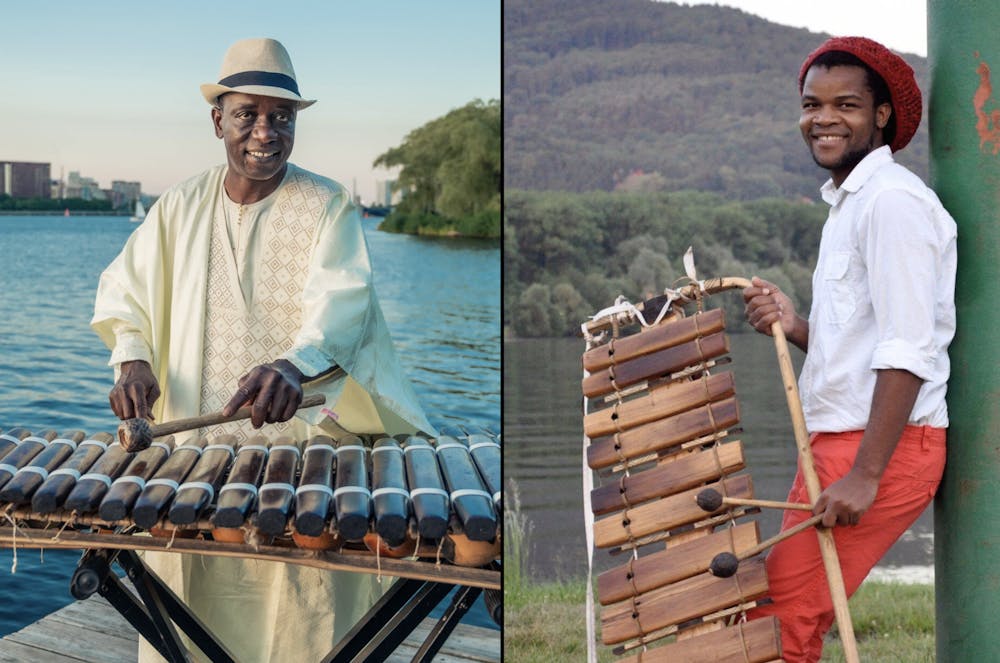On Friday, Oct. 4, Middlebury welcomed two renowned African musicians — Balla Kouyaté and Matchume Zango — for a night of musical wonder and communal merriment.
Balla Kouyaté is a virtuoso balafon player from Mali. His familial lineage dates back more than 800 years to Balla Faséké, whose descendants owned the world’s first balafon made in the 13th century, now under UNESCO protection. Often billed as fusion, his music explores jazz and other outside influences while remaining consciously rooted in the Mandé tradition. He is a member of Yo-Yo Ma’s Silk Road Ensemble, a community that has served as an inspiration to his current work. Teaching at the New England Conservatory of Music in Boston, Kouyaté closely collaborates with the college, where he has performed multiple times in the past two decades.
Matchume Zango, whose Oct. 4 performance marked his first concert in the United States, is a master timbila player born and raised in Mozambique. He is well known in the Southern African region for his spectacular timbila and dance shows and his many collaborations with international musicians. Zango recently completed a three-year project entitled Vasikate (meaning “women” in the Chopi language), which involved residencies and performances with female artists from Angola, Brazil, Guinea, Bissau and Mozambique.
The dynamic between the two musicians, who hail from East and West Africa respectively, was strong. They met not long ago, but quickly built an infectious rapport, which manifested in their on-stage interactions and the intimate interplay of their sounds.
“We had only begun rehearsing since mid-September, and we have to converse in English because Matchume speaks Portuguese and I speak French due to the different colonization histories of our countries,” said Kouyaté in a post-performance conversation with The Campus. Despite the language barriers, the two musicians achieved a seamless communion through music, their sounds merging into a naturalistic and contemplative whole.
Before the musicians’ entrance, background sounds of a waterfall and birdsong reverberated gently throughout the concert hall, which evoked a sense of naturalistic wonder that accompanies the conventional imagination of Africa. Blending fervent percussion with soulful chanting, Kouyaté and Zango conjured a musical harmony evocative of bygone longings, distant lands and the richness of earth. Besides one song, which, according to Kouyaté, was about the importance of young people harboring respect for the elders, the meanings behind the tunes were left to each listener’s interpretation, amplifying the emotive impact of the music to its fullest. The instruments on stage were predominantly percussive, except for an electric guitar, which blended harmoniously with the other instruments.
Bala Bila was also remarkable for its multimodality, adding a visual element to the musical performance. On a screen in the background, a documentary video played concurrently with the music, featuring scenes of life in Africa, from agricultural activities to tribal festivities. Seeing everyday life in Africa unfold in accompaniment to the music lent an anthropological dimension to this artistic experience. Zango told the audience that the video intends to draw attention to a rural lifestyle without electricity and, more importantly, climate change on the African continent.
“I had an amazing experience. Some of the tunes sounded familiar to me because Zimbabwe is adjacent to Mozambique. I am also familiar with the instruments, but the musicians’ level of talent is just out-of-this-world,” said Tatenda Mapungwana ’28, who watched the performance. “What’s even more amazing is seeing people from other cultures embracing and dancing to our cultural music. It shows that people appreciate different cultures, which is important in this world. I also felt connected to home through the visuals in the background featuring rural life in Africa, which brought back lots of memories,” Mapungwana said.
Beyond merely sitting in wonder, the Bala Bila audience became part of the music by echoing Zango’s singing and, during the last song, helping transform the concert hall into a massive dance party. Seeing people of all ages channel vibrant musicality through movement in a shared time and space was heartwarming. People clapped, sang and danced — it was a true testament to the unifying power of music.




